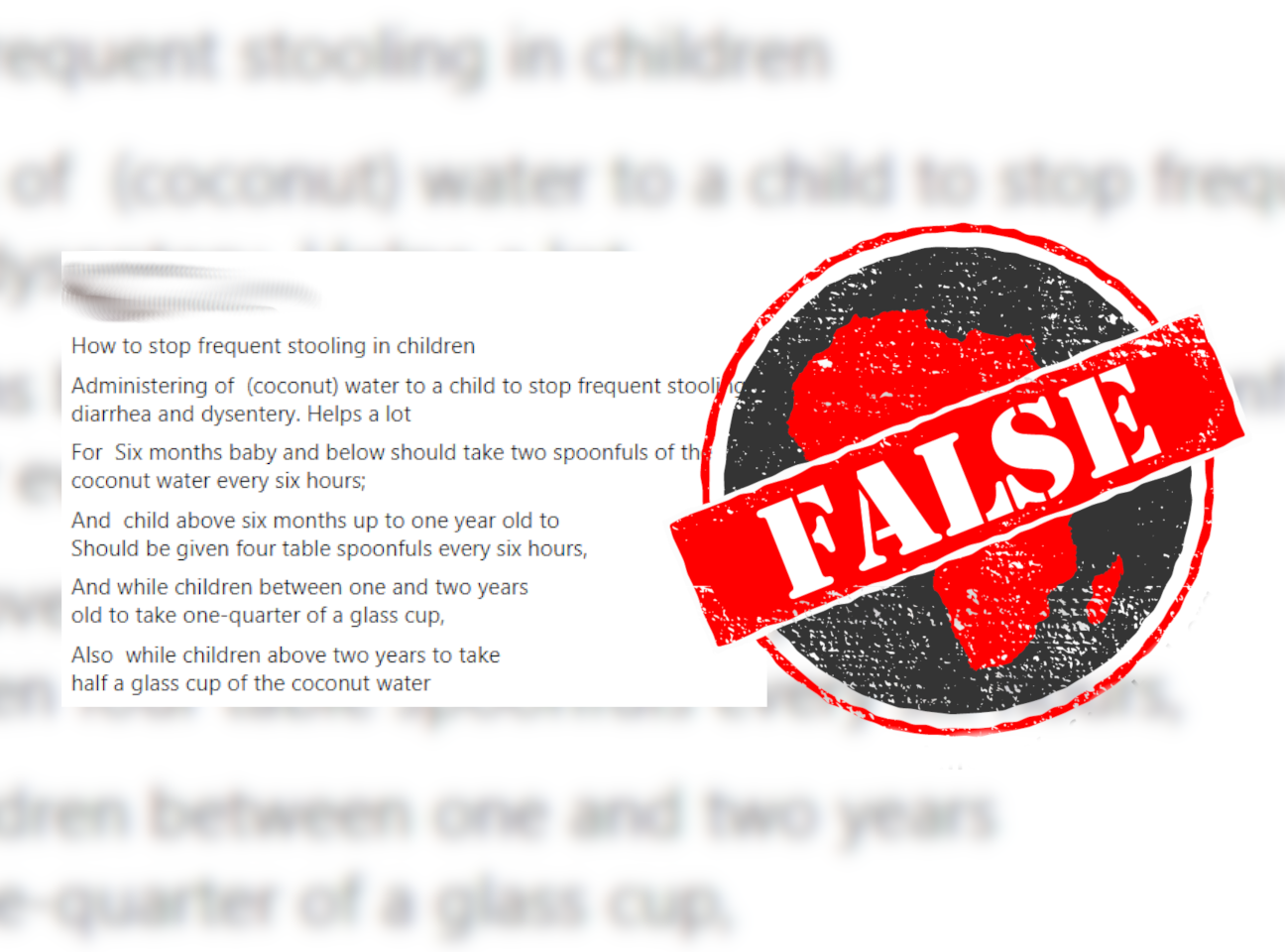Coconut water given “every six hours” will “stop frequent stooling, diarrhea and dysentery” in infants and small children.
That’s the claim in a dangerous message posted on “The Professor”, a Facebook page run from Nigeria.
The message says infants up to six months old should be given “two spoonfuls of the coconut water every six hours”, and babies aged six to 12 months “four table spoonfuls”. One-year-olds are to get a quarter of a “glass cup”, and two-year-olds a half of this measure, every six hours.

Diarrhoea life-threatening for babies
Diarrhoea is loose and runny poo, passed more often than usual. Some of its causes in babies include viral and parasitic infections, food poisoning and allergies. Acute diarrhoea leads to dehydration and can be life-threatening for babies and small children.
Diarrhoea is a preventable and treatable disease, the World Health Organization says, but is still a leading cause of death in children under the age of five.
Dysentery is one of the infections that can cause diarrhoea. Blood and mucus will show in the runny poo of a baby with dysentery.
If your baby has bad diarrhoea – caused by dysentery or something else – coconut water won’t cure it. Coconut water could prevent severe dehydration in your baby overnight, while you wait for healthcare facilities to open.
But as soon as you can, take your baby to a hospital or clinic.
Oral rehydration salts and professional care
Emmanuel Ekanem, a professor of paediatrics at the University of Calabar in southern Nigeria, told Africa Check that coconut water did not cure diarrhoea, or dysentery.
He said parents should take their babies to a hospital immediately.
“The treatment for the dehydration caused by diarrhoea is giving the patient fluids,” Ekanem said.
“The best fluid to give is an oral rehydration salts solution – known as ORS. For malnourished children who have diarrhoea we give them rehydration solution for malnutrition.”
He added: “For dysentery, doctors add antimicrobial agents. But we do not advise people to do this at home.”
Ekanem said coconut water could replace fluids lost to diarrhoea. But ORS would have a better result. Coconut water does not contain enough sodium.
Symptoms of dehydration
“Babies, children and the elderly are more at risk of dehydration,” says the UK’s National Health Service (NHS).
These are the symptoms of dehydration in babies, according to the NHS:
-
always sleepy or drowsy
-
fast breathing
-
few or no tears when they cry
-
a soft spot on their head that sinks inwards (a sunken fontanelle)
-
a dry mouth
-
a dark yellow pee, or no pee in the last 12 hours
-
cold and blotchy-looking hands and feet
Dehydration in babies is dangerous. If your baby has these symptoms, take them to a clinic or hospital as soon as you can.
Republish our content for free
For publishers: what to do if your post is rated false
A fact-checker has rated your Facebook or Instagram post as “false”, “altered”, “partly false” or “missing context”. This could have serious consequences. What do you do?
Click on our guide for the steps you should follow.
Publishers guideAfrica Check teams up with Facebook
Africa Check is a partner in Meta's third-party fact-checking programme to help stop the spread of false information on social media.
The content we rate as “false” will be downgraded on Facebook and Instagram. This means fewer people will see it.
You can also help identify false information on Facebook. This guide explains how.


Add new comment